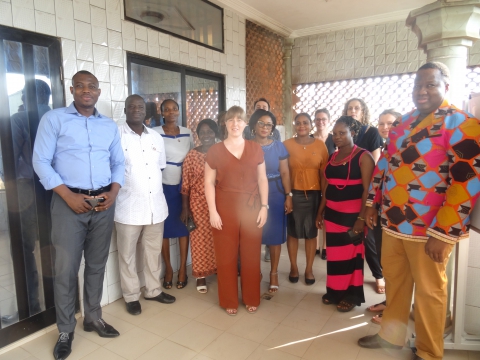
In the past year, the Association of Flemish Cities and Municipalities (VVSG) carried out a mid-term evaluation of its city-to-city partnership programme (2017-2021) using a ‘peer review’ approach. It proved to be a challenging but rewarding endeavour, especially in the context of Covid-19. Read more about peer reviewing below!
Background on the city-to-city partnership programme
The VVSG programme comprises 18 city-to-city links and 3 partnerships with local government associations in 10 countries. The partnerships in Benin were evaluated on site in the course of November 2019, while the partnerships in Ecuador were evaluated through online interviews in the course of September 2020. The main goal of the programme ánd the focus of the evaluation was institutional capacity building for good local governance.
CIB peers join the evaluations
The CIB network was crucial in the search for motivated international peer evaluators who were available, spoke the language and had monitoring and evaluation skills. The evaluation was carried out by staff members ‘international cooperation’ from the Region of Catalonia, the city of Ouagadougou and VNG International, aside from the Flemish evaluators. An external consultant provided methodological support. This approach was adopted because of the learning opportunities for both the peer evaluators and the partner cities.
Important learning experience for all
Of course, the peer review approach required an extra effort from the evaluators involved, but that effort was also rewarding, as the process proved to be a unique learning experience for all. The evaluators became acquainted with different evaluation techniques and with different visions on good local governance and decentralized development cooperation.
Marc Navarro Vicente (GENCAT, local government association of Catalonia): "I have gained a lot of inspiration for our own operations. Especially the different views on decentralized development cooperation and monitoring and evaluation were fascinating. But it was also inspiring to get to know the concrete collaborations and projects of the Flemish local governments and their partners."
Lessons learned: working with a large team ánd digitally
VVSG worked with a relatively large team of evaluators, each with their own vision on international cooperation, their own way of working and unique attitude during interviews. These different perspectives were of course fascinating and create opportunities to learn from each other, but also led to fragmented data collection. The lesson learned is that it is important to have a clear focus and agree on expectations and time investment beforehand. The time investment needs to be realistic. Throughout the process, it became clear that it was more important and useful to interview respondents in-depth than to speak to as many people as possible. Other lessons learned are that it is better to work with smaller evaluation teams and to collaborate with local evaluators as much as possible.
And then, of course, the Covid-19 pandemic forced the evaluation of Ecuador's partnerships to be done digitally. The advantage of this change was that it required less practical planning, but the turnaround time of the evaluation process did become longer. Moreover, it proved difficult to experience the local reality digitally and it was not possible to capture information that arises through body language or during informal moments of exchange. The number of respondents was also more limited. Furthermore, it was not possible to survey the final beneficiaries of the program.
Final remarks
Despite the major challenges, the evaluation process was a unique learning experience for the evaluators involved and resulted in both concrete and strategic recommendations that the twinning partners can use for their future operations. Both the input from the evaluation report and the enhanced digital skills are currently being put to use in the planning process of VVSG's new multi-year program 2022-2026.
Note from the CIB secretariat: do you also want to experiment with peer evaluators in your programme? Get in touch to see if the CIB network can be of help in this endeavour! (uclg.cib@vng.nl)
